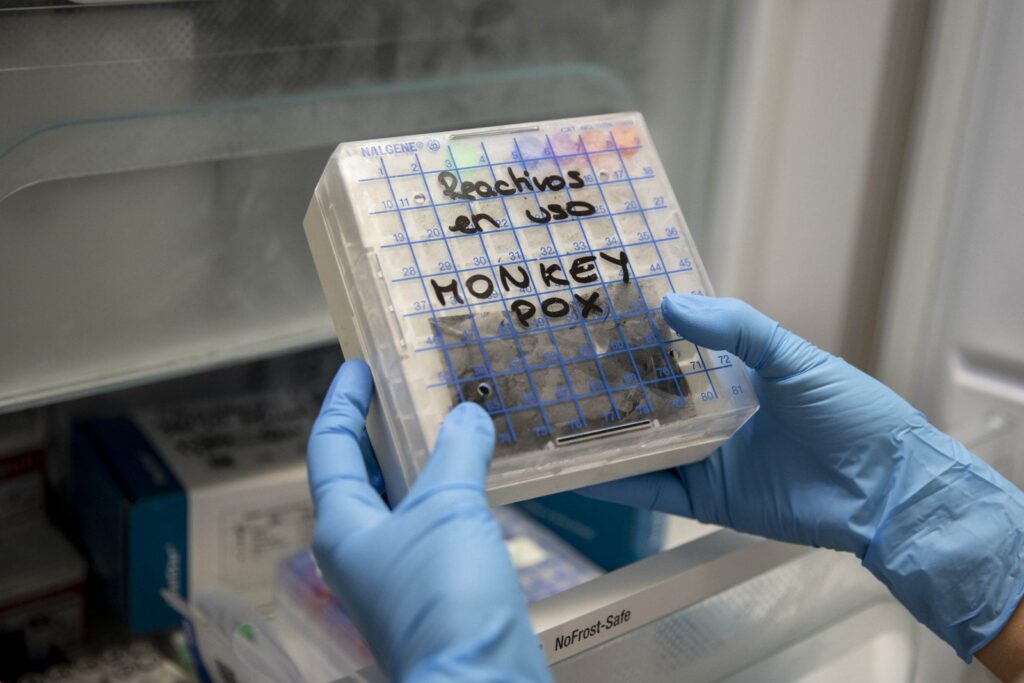
Indiscriminate: A technician in Madrid holds a monkeypox sample. Anyone who has close contact with an infected person can catch the virus. Photo: Pedro Blázquez Domínguez/Getty Images
IIn the past 20 years, the World Health Organization (WHO) has declared public health emergencies of international concern eight times.
The MPOX declaration about a week ago came in a surprising twist: the Africa Centers for Disease Control and Prevention (Africa CDC) was the first to officially declare it, marking a major milestone for agencies in the region that are driving new public health mandates.
The Africa CDC announcement “shows that people in Africa are aware of their problem and are taking steps to address it quickly,” said Dimie Ogoyina, an infectious disease specialist at the Niger Delta University Teaching Hospital who first reported sexual transmission of MPOX in Nigeria in 2017.
“The main reason we have a global pandemic in 2022 is because the outbreak in Nigeria between 2017 and 2019 was ignored by the international community,” he said.
Lessons were not learned, leading to the same results this year.
“We warned everyone,” Placido Mbala, an epidemiologist at the Democratic Republic of Congo's National Biomedical Institute, told Science magazine earlier this month.
The Democratic Republic of Congo declared a national outbreak in December 2022 and had it largely contained until late last year. The outbreak has now spread to Burundi, Kenya, Rwanda and Uganda.
So far in 2024, there have been about 3,000 confirmed cases and 517 deaths in at least 12 African countries.
Cases have been reported overseas in the past few days in countries including Sweden, Thailand and Taiwan, with a new sexually transmitted strain driving the spread of the virus.
The Africa CDC's declaration, which came a day earlier than the WHO's, marks the first test of whether the power to declare a health emergency will really work. African countries have called for the power in the wake of the COVID-19 crisis, and optimists hope it will come to fruition.
“With such missions, Africa CDC has
African governments are responding to the public health emergency in Africa.”
Ebele Okereke, former CEO of the African Public Health Foundation;
Spring Gombe, a strategist who has advised international organizations on health policy, hopes this will allow countries to respond more finely.
“Severely affected countries like the Democratic Republic of Congo will need and get different solutions.
To countries in crisis such as Burundi, Kenya and South Africa.”
But its greater powers have put the Africa CDC at odds with global health policy advocates, particularly the WHO.
In 2022, it was accused of lobbying against greater autonomy for African organizations: At an African Union meeting, around a dozen African health ministers reportedly repeated talking points from a document prepared by the WHO's Africa office, advocating for control of the Africa CDC. Devexa social enterprise and media platform for the global development community.
During emergencies in particular, friction can arise between local and global public health stakeholders, with serious consequences. Declaring a public health emergency is only the first step.
We need to break the chain of infection, develop treatments and raise awareness
And all of this requires concerted cooperation between actors and countries.
In a win-win option, a more autonomous and proactive Africa CDC could lead African leaders to “take full responsibility and full commitment to address the outbreak on the continent without waiting for help from the North,” Ogoyna said.
But efforts need to be made to do this without placing too much strain on key countries that mobilize most of the resources needed to put together a coordinated global response.
This article was first Continenta weekly newspaper distributed across Africa. Mail & GuardianEasy to read, Shared on WhatsApp. Download your free copy here

